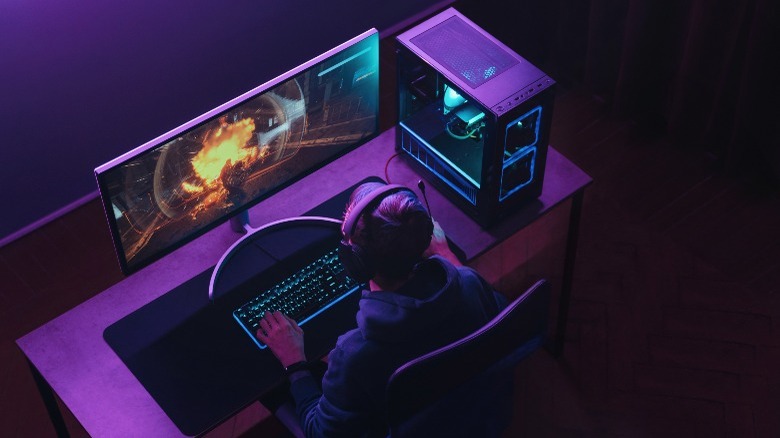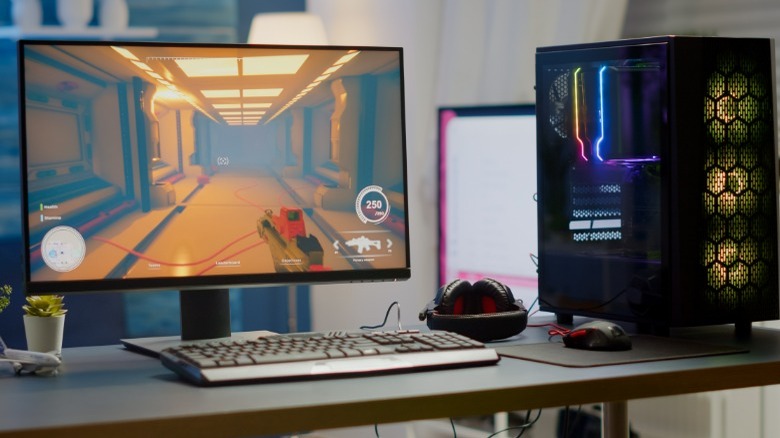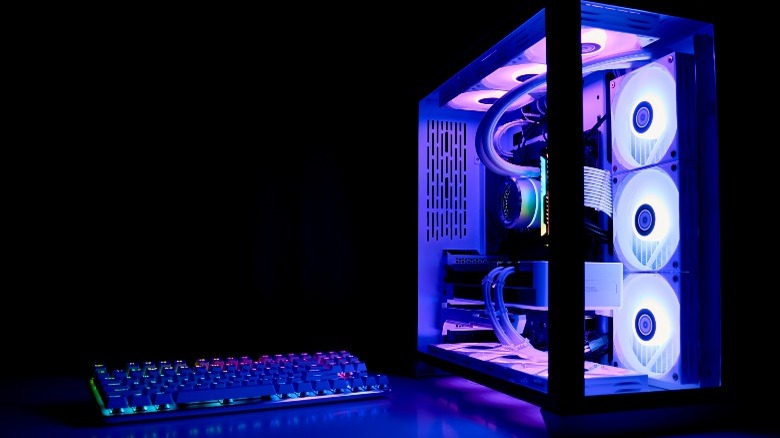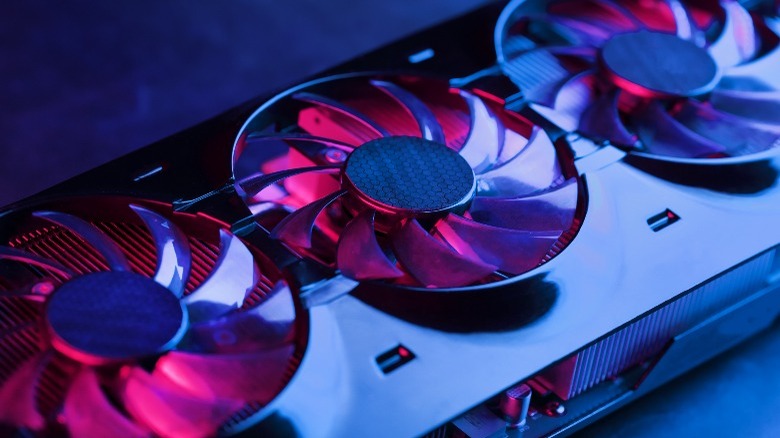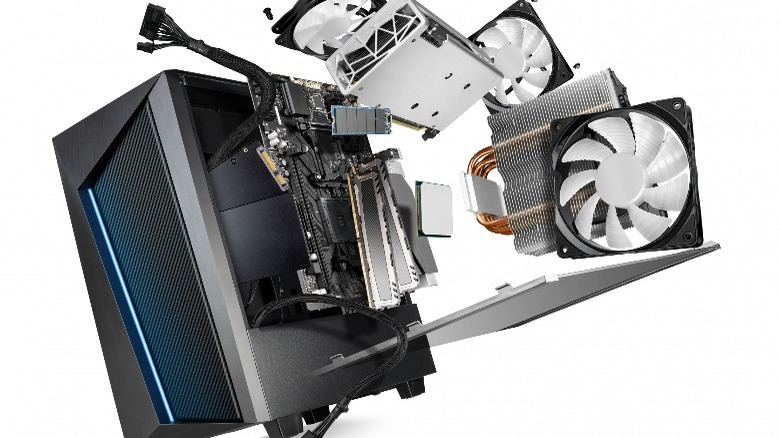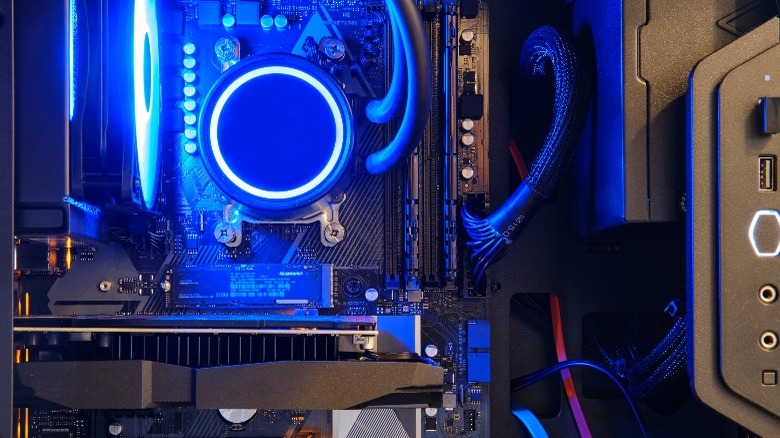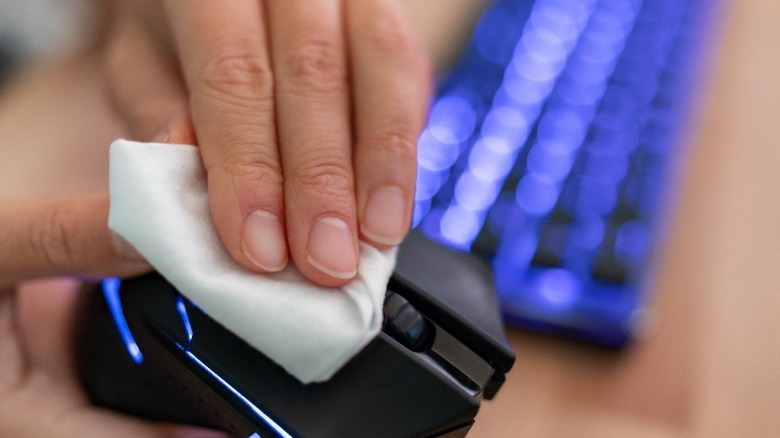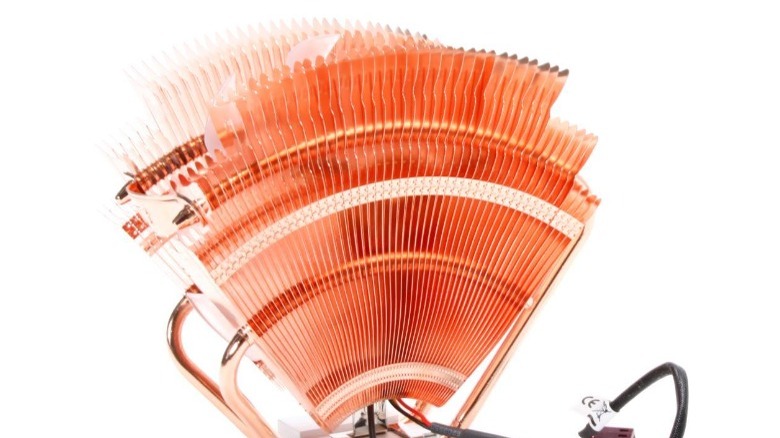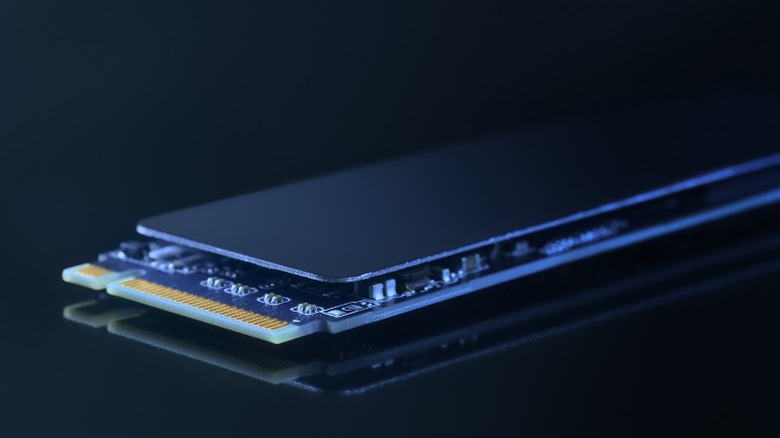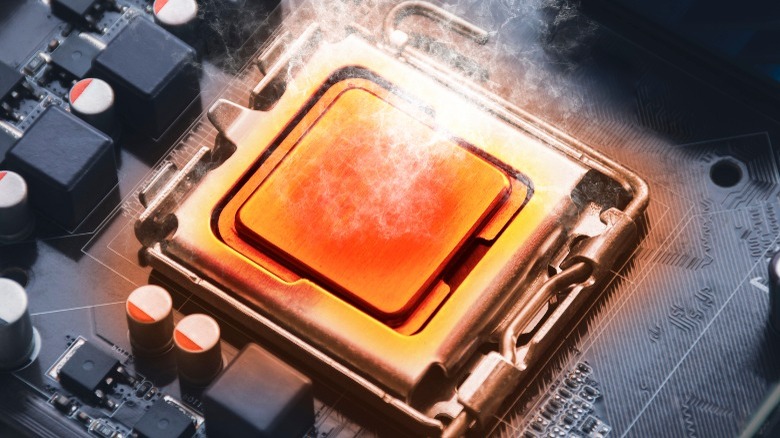10 Easy Ways To Cool Your Gaming PC
We may receive a commission on purchases made from links.
There's nothing more annoying for a gamer than an overheating PC. Modern games can run at such high settings in terms of frame rates and resolutions that they put components such as CPUs and RAM through heavy workloads, which causes them to heat up at rates that can be problematic. Not only are parts at risk of suffering permanent damage from high temperatures but the computer could also unexpectedly shut down. There's also the distracting noise of the fans to contend with as they work overtime to try and cool everything down.
Fortunately, there are some rather easy things that can be done to help cool down a gaming PC that won't break the bank or prove overly complicated. These can range from new parts that install in the computer to behaviors that will ensure that the system won't heat up too much in normal use. For anyone suffering from overheating, these solutions might provide the answer to stop things from getting too hot.
Position your gaming PC in a suitable location
Arguably one of the easiest and most effective ways of keeping a gaming PC cool and preventing it from overheating is to position it in a suitable location. When choosing where to put a gaming PC, players obviously take into account a lot of different factors and are often constrained depending on the layout of rooms and where they have a desk. However, special consideration should still be given to avoid having the computer in a spot that could cause issues.
The first among them is to avoid any place where the PC will be hit with direct sunlight. Natural light can cause problems for all types of electronics and will cause them to heat up unnecessarily. Direct sunlight may also stop electronics from being able to cool themselves effectively using other methods as well as potentially damaging parts such as screens. If a gaming PC has to be placed in the path of sunlight, then it is a good idea to keep it shaded. This could be done by keeping the computer under a desk or providing some sort of screen to protect it.
Just as important is to make sure that the desktop is not in an area where it will be hit with excess warm air. That means avoiding radiators and vents, as these will not only stop the PC from being able to cool down but could even heat it up further. Ensuring that the PC is away from direct sunlight and any sources of heat will give it the best chance of cooling down.
Provide plenty of space around the system
A key way to keep a gaming PC cool that is also incredibly simple is to simply give it enough space to breathe. A good rule of thumb is to have at least a few inches of space around every side of the computer so that it can easily expel warm air and take in cold air to aid in the overall cooling process. At the very least, it is vital to keep all fan openings and vents clear so that air can circulate as intended.
For the same reason, it is a good idea to have any type of PC in an open space rather than hidden away in a cabinet. While this may look tidier and reduce the noise coming from the computer, it would severely hamper its ability to cool down in an effective manner — especially if there is nowhere for the warm air coming out of the PC to go as this will heat up all of the air surrounding the computer.
To really help with cooling, gamers should also avoid stacking any other electrical devices on top of the PC. Although many people use desktops as a stand of sorts for monitors, external hard drives, or other hardware, this should be avoided as each of them will also give off heat and the end result will be that all the stacked devices rise in temperature together rather than cool down as designed.
Get the best case for your computer
Even those who aren't fully versed in the various components of a gaming PC will be aware of what the case is. It acts as a sort of outer shell for the different parts of the computer — from the motherboard to the hard drive and power supply — housing them all in one neat package. While the vast majority of people might stick to the case that comes with their PC, there is good reason for wanting to change it.
Certain cases are designed to provide extra cooling and regulate the temperature better. A good case, like the Lian Li Lancool 2 Mesh RGB, has a number of advantages that should ensure everything is kept at the correct temperature. Chief among them is the way that air flows through the case, with fans and vents allowing cool air to enter and warm air to be expelled. These cases also often have some form of filter to help stop dust and debris from getting into the system along with cable management to keep wires tidy to allow for better airflow.
Thankfully, switching out to a new case isn't that difficult of a task as most of the components will simply screw or click into place, so even those with little experience should be able to do it with an instruction manual or YouTube tutorial. Gamers also shouldn't be fooled into simply removing parts of the case for extra cooling either, as this will disrupt the airflow and expose the parts to dust and damage.
Upgrade the PC's component fans
Perhaps the most obvious way to cool down a PC is with fans. Everyone who has owned a computer of any kind, whether it be a laptop or desktop PC, will be familiar with the whirring that comes from inside the device as it tries to keep itself from overheating. What you may not know is that almost every component within a PC can have its own specific fan to help dissipate heat more effectively.
This can be particularly important for power-intensive parts that need to draw a lot of energy within gaming PCs, such as the CPU and GPU. These particular components can quickly reach high temperatures during intense gaming sessions and are responsible for generating the most heat within the case. Having specific fans for these parts can help them to regulate their temperature more efficiently and keep the whole computer operating at a higher level. Some good examples of these internal fans include the Deepcool AS500 Plus and the AsiaHorse Graphics Card Cooler.
The power unit is also a crucial part of a computer that can overheat as well. While specific fans for these are generally not available, choosing a power supply with a great in-built supply and other cooling features will help cool down the entire computer. Although good power supplies such as the XPG Core Reactor Modular PSU are not cheap, it is well worth opting for a good quality product rather than a cheaper version that might not perform as well.
Get a powerful case fan
The most obvious part of a PC that works on cooling the entire device is the case fan. Almost every computer will come with at least one large fan that is mounted on the side or front of the desktop tower that works to suck in cooler air and then push out the warm air generated by the internal components. A few aspects to consider about any new case fan is the amount of air it is capable of moving as well as how fast it spins at its highest setting.
The more air it can push through the case, the more effective it will be at cooling down the PC and its components. Meanwhile, a fan that works effectively at a lower RPM will be quieter than faster alternatives. Therefore, it will be important to find the right fan for your own setup, especially when they can vary in size. If possible, gamers should also install an extra fan so that there is one at the front and one at the rear, improving the airflow and making the system more efficient.
Perhaps the most highly recommended case fan is the Noctua NF-S12B redux-1200. It can deliver almost 60 cubic feet of air per minute and operates at just over 18 decibels, making it whisper quiet compared to fans that gamers might otherwise be familiar with. The relatively low price of case fans, often costing less than $20, means that they are among the most cost-effective ways of cooling down a PC.
Install a water cooling setup
Most computers will come with a default setup that utilizes air cooling from fans and heat sinks. Yet, there is another way to keep a gaming PC from overheating that is far more effective than any air cooling system. Water or liquid cooling involves an enclosed transfer network that transports the coolant to components where it can absorb the heat and then moves it outside of the computer to a radiator where it can dissipate the excess energy before being sent back into the PC.
A liquid cooling setup may well be necessary for those with high-end PCs that are capable of running top-of-the-line games at their highest settings. Traditional fans and airflow cooling might simply not be able to cool down a gaming PC at a rate that is useful. In these instances, a liquid cooling system may be necessary, although it will provide efficient cooling to any gamer who is playing on a PC regularly. As an added bonus, they also produce less noise than other options.
While installing liquid cooling may seem complicated at first, there are a number of water cooling kits available that make the process fairly easy. SlashGear reviewed the CoolIt PURE in 2019 and found that it can be installed in less than half an hour without the need for any real expertise — and it won't break the bank, either.
Canned air can help clean out dust
Overheating is a problem that any gamer can experience, whether they are playing on a PC or a console. Arguably the biggest culprit when it comes to any electronic device getting too hot is dust and dirt. Debris can easily clog up the small openings on a PC, which can affect airflow by stopping cold air from being brought into the computer or preventing the removal of hot air. Dust can also accumulate on internal components, stopping them from working efficiently and causing a heat build-up.
Cleaning a gaming PC can be as simple as giving it a wipe with a microfibre cloth or using a can of compressed air to really get deep into the computer. For those who really want to give their PC a deep clean and make sure it is running at its absolute best, SlashGear's own guide should provide some helpful tips for taking apart the case and what tools you will need.
As part of making sure that the PC is clean and able to work efficiently, users can also help the airflow by ensuring that it is kept elevated away from the floor where it might attract more dust and dirt. It can also help to keep any devices such as desktops and laptops away from pets as fur can also clog up the machine. Keeping the computer entirely clean at all times will be impossible but frequent vacuuming and dusting should help the situation.
Get more effective heat sinks
In addition to fans, including both case and component fans, and liquid cooling setups, there is another important part of a PC that helps to keep it running at the right temperature. These are known as heat sinks and are typically attached to internal components such as the CPU or GPU with thermal paste. The heat sink works by absorbing the heat directly from these processors and then transferring it to metal fans that have a higher surface area to help dissipate it quicker.
Fortunately, there are lots of options for heat sinks on the market and most of them are interchangeable so you won't have to buy a specific version for your particular CPU or GPU. The vast majority of good heat sinks also come with fans that help to move air through the metal part and absorb the heat at a faster rate. A good example of this is the Thermaltake V1 CPU Cooler. This particular heat sink comes with two copper fins that have been designed to conduct and dissipate heat as quickly as possible in conjunction with a 110mm fan.
Use SDDs rather than traditional hard drives
In recent years, SSDs have become more widespread as they have reduced in price to become more affordable and been manufactured in greater numbers. Compared to traditional hard drives, an SSD comes with several advantages over other storage solutions, especially for gamers. SSDs have faster read and write speeds compared to standard hard drives, meaning that games not only boot up quicker but also have much shorter load times. They are also less prone to malfunction and data loss, meaning that saved data for your favorite games are much less likely to go missing.
The nature of SSDs also means that they generally produce less heat than their counterparts. This is because, unlike hard drives, an SSD doesn't have any moving parts and so generates no friction, which in terms leads to a higher temperature. SSDs also require significantly less power as there is no risk to spin. With less energy going through the SSD, it doesn't heat up as much and will therefore help keep the entire PC cooler than it would be with a hard drive. Of course, SSDs are more expensive than hard drives, but they are a simple and effective way to help cool a gaming PC and there is plenty of choice when it comes to upgrading a computer's storage.
Run the PC in a responsible manner
A popular method of increasing the performance of a gaming PC without having to buy new components is to overclock the computer. This involves running the CPU and GPU at higher speeds than they are technically designed to. The result is that they can perform more operations in a shorter amount of time and dramatically improve performance for games. This means that these parts have to consume more energy and work harder, making them rise in temperature at a faster rate than they normally would.
Without powerful cooling setups, overclocking can easily cause a PC to overheat or even suffer damage as the components exceed their specifications. So a quick and easy way to cool down a PC that has been overclocked is to run it as intended so it is less likely to overheat. Gamers can also make sure to run the computer in a responsible manner when it comes to switching it off when not in use or allowing the PC to enter hibernation mode. Closing unnecessary apps and software will also allow it to more easily regulate its temperature and allow the cooling systems to do their job.

